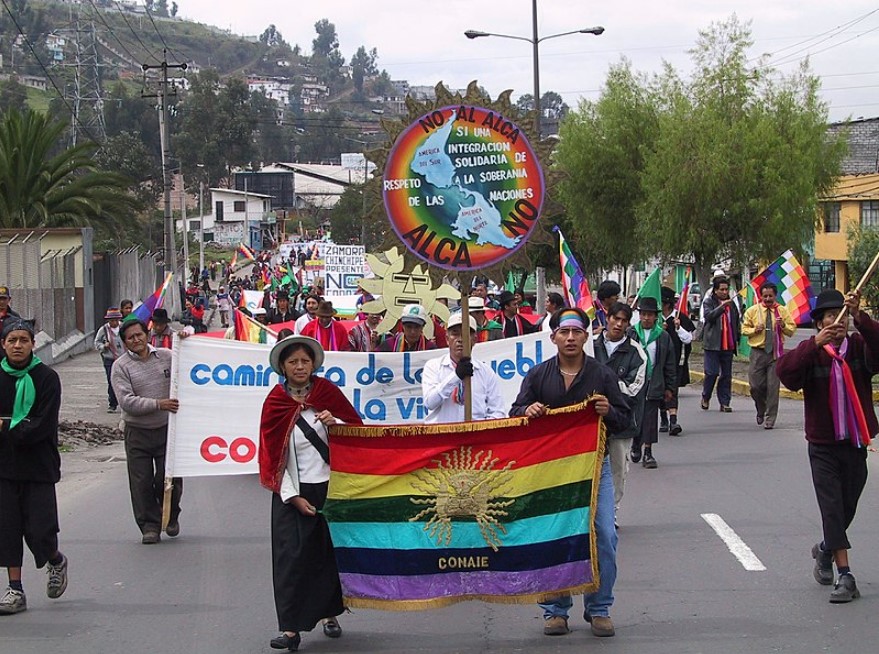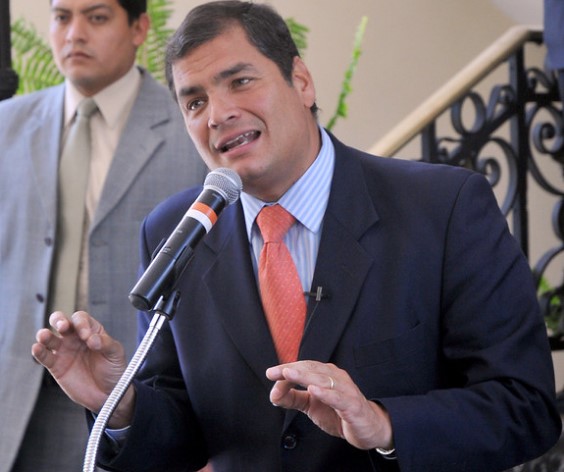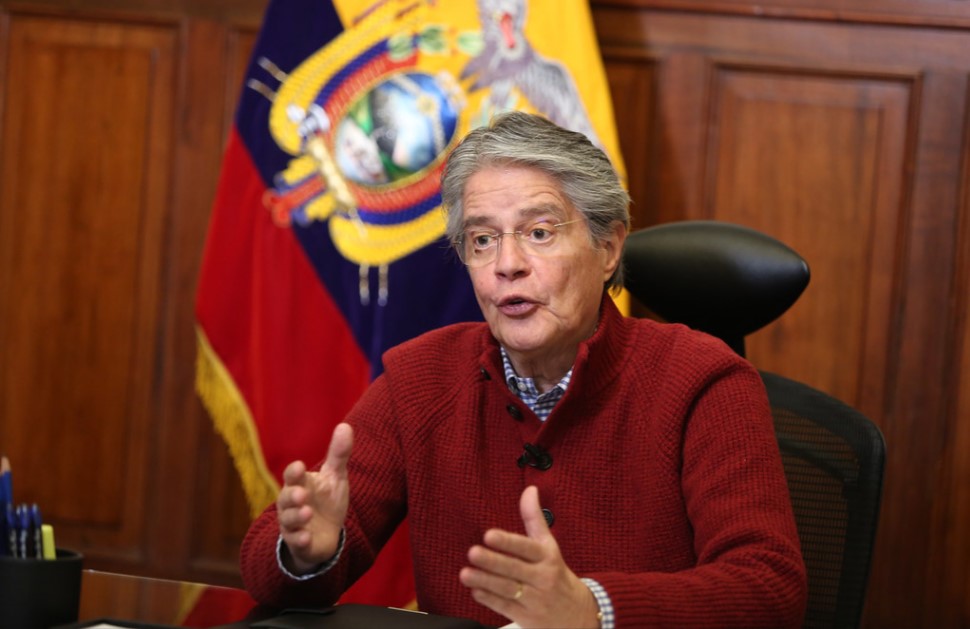Ecuadorians went to the polls last Sunday, 5 February, for municipal elections and to vote in an eight-question referendum called by the banker-president Guillermo Lasso. Lasso’s party came out of the municipal elections completely defeated, while ‘Yes’ – defended by Lasso – lost in all eight questions of the referendum. The elections were a hard blow to the capitalist oligarchy and its political representatives.
Lasso has now paid the price of the June 2022 national strike through the ballot box, and the extent of his demoralisation has become clear. The brutal repression, the nine deaths, and the inability to minimally address the demands of the streets left him completely isolated. Even his allies are abandoning him.
Municipal elections
Citizens’ Revolution (Revolución Ciudadana), the party of the former president, Rafael Correa, was the big winner in the municipal elections. It won nine prefectures out of 23 provinces, including the three largest provinces of Ecuador: Guayas, Pichincha and Manabí. These three provinces are home to 52 percent of Ecuador’s population. The party won 61 mayoralties across Ecuador’s 221 cities, winning in the two largest cities: Guayaquil and the capital Quito. The right wing has ruled the city of Guayaquil – one of its electoral fiefdoms – for more than 30 years. Its defeat here is an important victory for the left.
 Pachakutik, the electoral front of CONAIE, won six prefectures and 27 mayoralties in the municipal elections / Image: Donovan & Scott
Pachakutik, the electoral front of CONAIE, won six prefectures and 27 mayoralties in the municipal elections / Image: Donovan & Scott
Pachakutik, the electoral front of CONAIE (Confederation of Indigenous Nationalities), which played a leading role in the June 2022 national strike, won six prefectures and 27 mayoralties. Winning in the provinces of Cotopaxi and Tungurahua, in the Ecuadorian highlands, where the national strike had a great impact, the governorships of these two provinces were taken over by the protesters at the time.
The Social Christian Party, the traditional party of the ruling class, won just two prefectures and 32 mayoralties. The right-wing CREO Movement of the banker-president Lasso himself didn’t win a single prefecture, and won only 22 mayoralties. This was the worst result for the right in decades.
The referendum
Lasso gambled on the referendum as a test of his popularity. He drew up eight questions that could only be answered with a ‘Yes’ or ‘No’. The referendum questions were biassed: questions that, at first glance, no one could be against, such as reducing the expenses of assembly members, greater “citizen” participation in bourgeois institutions, and so on. The referendum had been formulated such that the ‘Yes’ vote would win, thus demonstrating Guillermo Lasso’s popularity. However, it has been resoundingly defeated. The ‘No’ vote won on all eight questions, defying the predictions. Adding up all the votes, ‘No’ won by 55 percent.
After his electoral failure, Lasso has made a desperate call for a ‘national agreement’ to govern until 2025, but Citizens’ Revolution, CONAIE, and even the Democratic Left have rejected it. Lasso has no legitimacy to govern the country, and is unlikely to be able to govern until the next elections. Now is the time to take the initiative and return to mass mobilisation on the streets. Lasso is on the ropes, but a top-down solution to this crisis is not the same as a solution imposed by the action of the masses in the streets.
CONAIE
CONAIE played a leading role in the extraordinary national strike of June 2022, but in the end the movement was suspended with the promise of negotiations that would deal with the ten points that (according to the leadership of CONAIE) were the core demands of the streets. At the time, we warned that without mobilisation in the streets, the round of negotiations would not progress in favour of the workers and peasants.
In CONAIE’s assessment, barely 10 percent of the demands were met in the negotiations, and the Lasso government has failed to fulfil its promises. As such, it makes no sense to maintain dialogue with the president, and CONAIE has announced that it will return to struggle in the streets.
CONAIE campaigned for a ‘No’ vote in the referendum and has welcomed the result at the ballot box as a victory for the movement. CONAIE turned down Lasso’s call for a national agreement with scorn, and emphasised in its 9 February press release: “CONAIE will not be part of any national agreement because Guillermo Lasso’s word as president has no validity.”
Citizens’ Revolution
Citizens’ Revolution has already been through the experience of the government of Rafael Correa (2007-2017), whose reformist policies – at a time of high commodity prices – allowed some advances for the Ecuadorian working class. Correa’s government did not, however, touch the property of the ruling class, and it therefore did not fundamentally change the relations of power and property.
 Rafael Correa's government, whilst allowing for some reforms, did not touch the property of the ruling class / Image: Presidencia De La Republica Del Ecuador
Rafael Correa's government, whilst allowing for some reforms, did not touch the property of the ruling class / Image: Presidencia De La Republica Del Ecuador
In 2017, Correa appointed Lenin Moreno as his successor, but the latter betrayed the movement, made a pact with imperialism, and applied a brutal package of austerity measures. When the masses took to the streets in October 2019, he unleashed harsh repression, giving way to the victory of the banker, Lasso, in 2021.
An eventual return of Citizen’s Revolution to power would take place under very different conditions from Correa’s term in office. It would ascend in the midst of an acute crisis of global capitalism that leaves very little room for manoeuvre to implement reforms within the narrow confines of capitalism.
The lesson to be learned is that in a backward capitalist country, dominated by imperialism and multinationals, controlled by a particularly parasitic and reactionary oligarchy, the only way to bring about a fundamental change in the living conditions of the majority is the seizure of power by the working class at the head of all the poor and oppressed layers in the countryside and the city.
This is also the lesson of recent events in Peru. Pedro Castillo’s hesitations and concessions did not succeed in appeasing the ruling class. The economic and political power of the ruling class in Ecuador must be expropriated so that the working class, at the head of all the oppressed in the countryside and the cities, can truly take control of the production of material goods to improve their living conditions.

